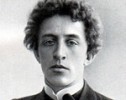Alexander Blok

Alexander Alexandrovich Blok (Russian: Алекса́ндр Алекса́ндрович Бло́к; 8 November [O.S. 16 November] 1880 – 7 August 1921) was a Russian lyrical poet.
Blok was born in Saint Petersburg, into a sophisticated and intellectual family. Some of his relatives were literary men, his father being a law professor in Warsaw, and his maternal grandfather the rector of Saint Petersburg State University. After his parents' separation, Blok lived with aristocratic relatives at the manor Shakhmatovo near Moscow, where he discovered the philosophy of Vladimir Solovyov, and the verse of then-obscure 19th-century poets, Fyodor Tyutchev and Afanasy Fet. These influences would affect his early publications, later collected in the book Ante Lucem.
In 1903 he married Lyubov (Lyuba) Dmitrievna Mendeleeva, daughter of the renowned chemist Dmitri Mendeleev. Later, she would involve him in a complicated love-hate relationship with his fellow Symbolist Andrei Bely. To Lyuba he dedicated a cycle of poetry that made him famous, Stikhi o prekrasnoi Dame (Verses About the Beautiful Lady, 1904).
Blok's few relatives live currently in Moscow, Riga, Rome and England.
During the last period of his life, Blok emphasized political themes, pondering the messianic destiny of his country (Vozmezdie, 1910–21; Rodina, 1907–16; Skify, 1918). Influenced by Solovyov's doctrines, he had vague apocalyptic apprehensions and often vacillated between hope and despair. "I feel that a great event was coming, but what it was exactly was not revealed to me", he wrote in his diary during the summer of 1917. Quite unexpectedly for most of his admirers, he accepted the October Revolution as the final resolution of these apocalyptic yearnings.
 čeština
čeština Deutsch
Deutsch français
français magyar
magyar polski
polski русский
русский English
English Azərbaycan
Azərbaycan беларуская
беларуская italiano
italiano ქართული
ქართული Nederlands
Nederlands português
português slovenčina
slovenčina español
español 中文
中文 қазақ
қазақ







